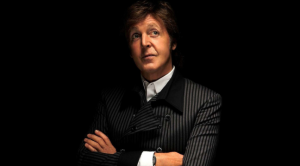
Paul McCartney – Back in the U.S.S.R.: A Tongue-in-Chuck Berry Tribute with Political Nuance
In the tapestry of Paul McCartney’s illustrious career, both as a solo artist and with The Beatles, “Back in the U.S.S.R.” stands out as a curious and playful anomaly. Released in 1968 on the double album simply known as “The Beatles” (often referred to as the “White Album”), the song injects a dose of lighthearted satire amidst the album’s introspective and experimental tracks.
Background
While credited to the songwriting partnership of Lennon-McCartney, “Back in the U.S.S.R.” is largely attributed to McCartney’s pen. The song draws clear inspiration from Chuck Berry’s rock and roll anthem “Back in the U.S.A.,” borrowing its melody and structure. However, McCartney subverts Berry’s patriotic sentiment with a tongue-in-cheek celebration of returning to the Soviet Union, formally the Union of Soviet Socialist Republics (U.S.S.R.).
The historical context surrounding the song’s release is crucial for understanding its subversive humor. The Cold War was at its peak, with the U.S.S.R. and the West locked in a tense ideological battle. Western media often portrayed the Soviet Union as a restrictive and joyless society, a stark contrast to the perceived freedom and prosperity of the West. “Back in the U.S.S.R.” playfully flips this narrative, with the narrator expressing relief and pleasure upon returning to the Soviet Union.
The song’s lyrics, filled with playful rhymes and nonsensical references to Soviet cities, are not meant to be a genuine endorsement of the U.S.S.R. Instead, they serve as a lighthearted commentary on the Cold War’s political tensions. McCartney’s signature bassline and playful vocals further contribute to the song’s sense of humor.
“Back in the U.S.S.R.” was a unique experiment for The Beatles. It showcased McCartney’s ability to blend catchy melodies with witty social commentary, a talent he would further explore in his solo career. The song’s playful subversion of Cold War rhetoric resonated with a generation questioning authority and societal norms.
Despite its lighthearted nature, “Back in the U.S.S.R.” sparked some controversy upon its release. Some Soviet officials interpreted the song as a mockery of their society, while others saw it as a harmless pop tune. The song remains a fascinating example of how pop music can utilize humor and satire to address complex political realities.
See More: Paul McCartney – Yesterday
Video
Here are some additional details about the song:
- The song was released in 1968 on The Beatles’ album “The Beatles” (also known as the “White Album”).
- The song was primarily written by Paul McCartney with some input from John Lennon.
- “Back in the U.S.S.R.” reached number 10 in the UK Singles Chart and did not chart in the United States.
- The song remains a popular choice for live performances by Paul McCartney.